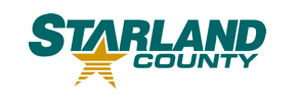Starland County has sponsored three important resolutions for the Alberta Association of Municipal Districts and Counties (AAMDC) and is excited to have the membership vote on them at their fall convention. 
Starland County has drafted three resolutions, one dealing with the STEP program, one dealing with solar power and one with water management. Ross Rawlusyk, CAO for Starland County explains that these resolutions received strong support at their zone meetings and were adopted to be carried to the provincial meeting. If they are adopted by the AAMDC, they will become key lobbying points for the body.
Rawlusyk’s concern for water management issues came earlier this year at the Water for Life meeting where the idea of the “Scottish model” of regional water systems was floated. Starland has spent many years and thousands of dollars to develop an extensive water system for rural ratepayers and he hopes they can protect it.
“We thought maybe if we get out in front of this, maybe they won't pursue it as policy,” he said.
The resolution simply states: “Therefore be it resolved that the AAMDC oppose any forced regionalization of management control over municipally owned water utilities.”
The backgrounder to their resolution explains that one of the proposed directions involves potentially legislating the regionalization of management over the operation of municipally owned water.
It states, while the government’s stated goals of increased financial sustainability and improved service is admirable, it has failed to take into account the benefits of local management or show that residents are ill-served by the current model of funding and operation of municipal water systems.
“However if the Government of Alberta wants to support regional water systems it should continue to fund the voluntary regionalization of this service through the options already in place. New legislation is not required for something that already makes sense for individual communities and would instead just force the regionalization of communities for whom it does not,” it states.
Another resolution is to deal with reinstating the Light Up Alberta Program to assist and encourage micro generation.
The resolution states that after the 2009 passage of the Micro Generation Regulation, which streamlined the regulatory process for connections up to 10 kilowatts of solar power to the grid, the Alberta government instated the Light Up Alberta Program. This offered a small incentive to residents who took a risk and installed micro generators. While it wasn’t enough to change the economics of installing such a system, it did show the government was supportive of this new field and could see its benefits.
A number of producers have started up since the program was introduced and it may have played a role in their decision to install a solar array. Without the program, some may not have taken the risk.
The other issue has less to do with the repeal of the program, but how it was done. There were no stakeholder consultations, nor advance warning.
The resolution reads: “Therefore be it resolved that the AAMDC support Alberta’s small rural power producers by lobbying the Government of Alberta to reinstate the “Light Up Alberta” program and engage in a thorough stakeholder consultation before amending the Micro Generation Regulations.”
The County’s final resolution has less to do with Starland itself, but other smaller communities and their non-profit and cultural institutions.
The Summer Temporary Employment Program (STEP) was cancelled this year. The program gave small non-profit organizations the ability to hire students for temporary help.
The County’s resolution reads: “Therefore be it resolved that the AAMDC lobby the Government of Alberta to reintroduce the STEP grants or a similar wage support program for the non-profit and volunteer sector in Alberta.”
Rawlusyk says the program is beneficial to the community. Often these institutions are attractions or support the community in other ways. The type of jobs STEP supported were perfect for students from the rural areas who could return home for the summer, or it could bring new faces to the community.
“As part of the March 8 update on the STEP program the Minister indicated the government’s willingness to work with the Voluntary and Not for Profit Sector to increase wage supports for this sector. As budget season comes around again it is important for the Government of Alberta to follow through on these words and provide the support that this sector desperately needs,” states the document.
The AAMDC Fall convention is November 12-15.